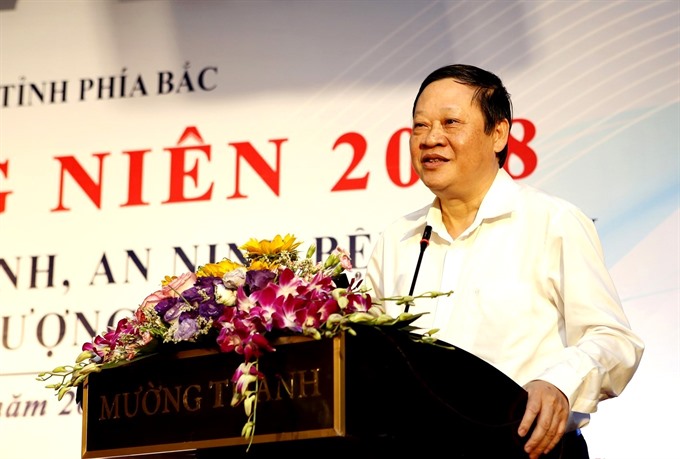 Society
Society

Recent surveys amongst 1 million correspondents show inpatients’ satisfaction with hospital services in Việt Nam reached 75.6 per cent, while the figure for outpatients is at 66.3 per cent.
 |
| Deputy minister of health Nguyễn Viết Tiến speaks at the 2018 annual conference gathering directors of northern region hospitals. — VNA/VNS Photo Dương Ngọc |
THANH HOÁ — Recent surveys amongst 1 million correspondents show inpatients’ satisfaction with hospital services in Việt Nam reached 75.6 per cent, while the figure for outpatients stands at 66.3 per cent.
The overloading situation in major hospitals has also witnessed improvements, with the rate of patients having to share their beds with others going down to 16.6 and 11.4 per cent in central-level and provincial-level hospitals, respectively, a dramatic decrease compared to 2012’s 58 and 47 per cent.
These numbers indicate that the country’s health sector is getting better but still has plenty of room to improve their service delivery, said Lương Ngọc Khuê, head of health ministry’s department of medical examination and treatment in the annual conference that gathers directors of major hospitals in the northern region.
Patients’ safety, hospital security and financial autonomy were chosen as the theme of this year’ conference, reflecting the urgent issues that the health sector identified as focal points in 2018.
Given the rising violence against medical staff in hospitals, directors of hospitals have been asked to reinforce security forces in their institutions, form co-operation mechanisms with the police, and establish quick response security teams.
Nguyễn Ngọc Hiền, deputy director of the Hà Nội-based Bạch Mai Hospital, one of the largest public hospitals in the country, said his hospital has implemented a number of measures to increase income while cutting back on costs, most notably stringent financial management to effectively monitor spending or revenues of each of the medical unit.
The wage of the medical staff is now calculated based on his/her performance and productivity, instead of a fixed rate.
Hiền said Bạch Mai hospital has also opened up collaboration with the private sector. By the end of 2017, the hospital has managed to mobilise some VNĐ1 trillion from partnerships of this nature, in order to purchase cutting edge medical equipment, including a surgery robot and 256-slice CT scanners.
Nguyễn Quốc Anh, director of Bạch Mai Hospital, chair of the northern region hospitals club, in his closing speech, said the various issues regarding financial management towards more autonomy, hospital security, and social security management need inter-hospital co-operation to be effectively solved.
Directors of hospitals need to also pay more attention to their roles as the bridges between their medical institutions and the health ministry, in order to better implement the tasks given, Quốc Anh said.
Fianancial autonomy
The Ministry of Health said that as many as 25 public hospitals have been applied financial autonomy, and the result has showed positive effects.
As a result as many as 25,000 health staff no longer have their salary paid by the State, saving the budget VNĐ1.5 trillion (US$66 million) per year, it said
Speaking at a conference on financial autonomy at public hospitals on Thursday in central Thanh Hoá Province, Phạm Văn Tác, head of the ministry’s Organisation and Personnel Department said that the ministry has now officially provided the right of financial and managerial autonomy for public hospitals nation-wide.
Under the decision, these hospitals are now assigned to take responsibility of their own operation expenses, organisational structure, and recruitment of employees.
The heads of each unit will be assigned the right of self-financing their unit’s operation activities, and will be responsible for formulating, supplementing and amending regulations of their units.
Financial and managerial autonomy has been applied at public hospitals in Hà Nội and HCM City since last October. In Hà Nội, five hospitals have carried out 100 per cent financial autonomy. In HCM City, seven have carried out full autonomy and 44 given partial autonomy.
Financial autonomy is designed to help reduce State expenditures. The funds will be diverted to preventive medicine, improving community-care programmes, and allowing the State to pay for more health insurance cards for the poor, including those near the poverty line and welfare recipients. — VNS




